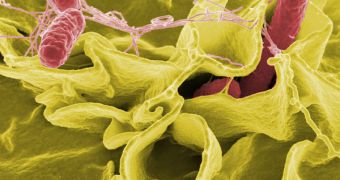Research conducted on the International Space Station in 2006 and 2008 has finally revealed for certain something that virology experts have suspected for a long time, and namely that salmonella grows to be more or less dangerous depending on its environment. In the micro-gravity surroundings of the ISS, the bacteria became much more virulent than they regularly were on Earth, a find that, one day, might yield a new treatment for people who would be infected by the pathogen.
According to NASA experts, this knowledge will be used in future researches to analyze how various environments back on Earth influence the way in which salmonella manifests itself in various populations across the world. “This research opens up new areas for investigations that may improve food treatment, develop new therapies and vaccines to combat food poisoning in humans here on Earth, and protect astronauts on orbit from infectious disease,” Julie Robinson, who is an ISS program scientist at the American space agency's Johnson Space Center, in Houston, says.
The US Centers for Disease Control and Prevention (CDC) estimates that approximately 40,000 citizens contract the dangerous bacteria each year and develop symptoms associated with food poisoning and other similar illnesses. Most infections can be avoided if people wash the fruits and vegetables they buy very well, under a powerful stream of water. Personal hygiene, such as washing one's hands, is also paramount in destroying the dangerous bacteria before they enter the human body.
“To our knowledge, no one had previously looked at a mechanical force like fluid shear on the disease-causing properties of a microorganism during the infection process. We can use the innovative research platform of the space station to contribute to new translational advances for the development of new strategies to globally advance human health,” ISS experiments principal investigator Cheryl Nickerson, from the Arizona State University in Tempe's Biodesign Institute, adds.
According to the research that was conducted on the ISS, regulating the number of ions in the atmosphere around the bacteria cultures drastically influenced their virulence. If experts can now come up with a way of reproducing ion-controlling chambers back on Earth, then salmonella could easily be eradicated from the face of the planet.

 14 DAY TRIAL //
14 DAY TRIAL //